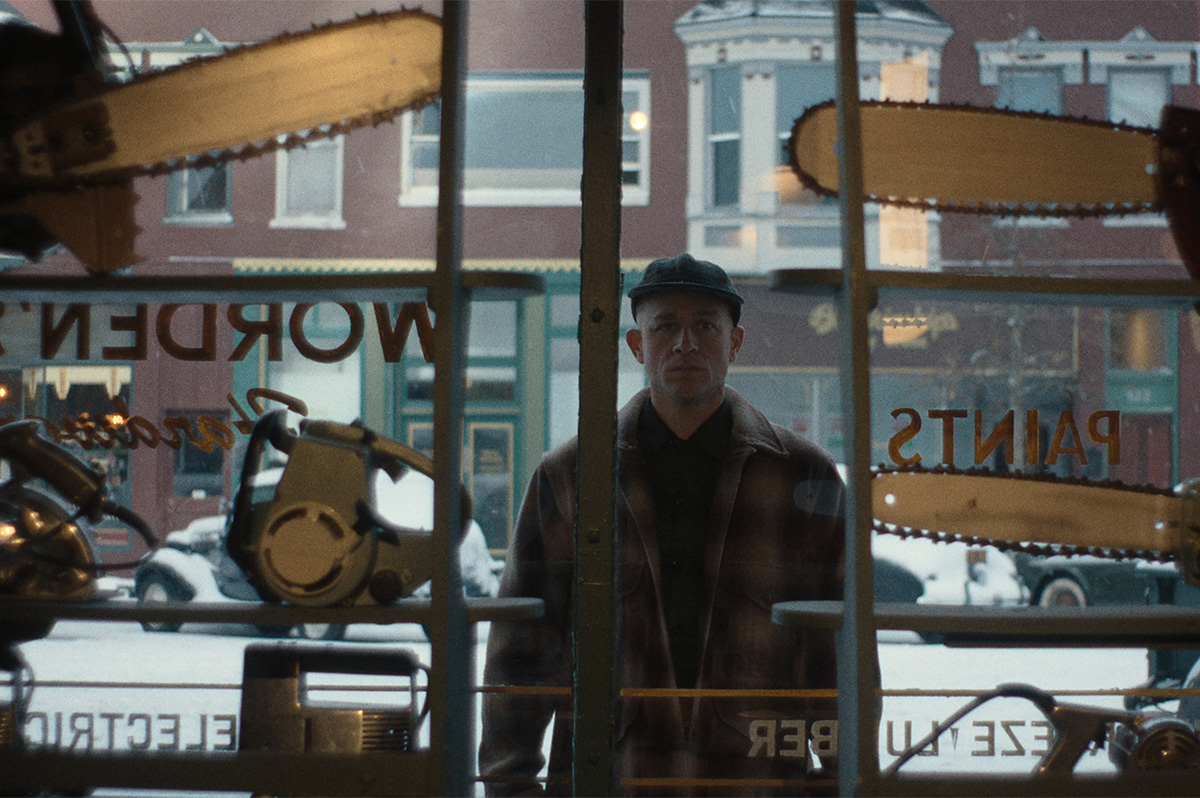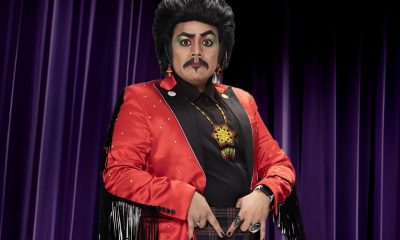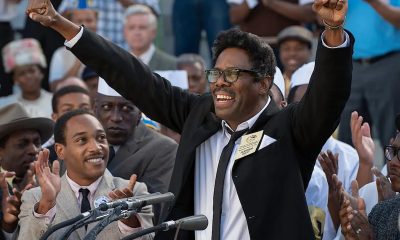Television
Plenty of queer storylines headed to the small screen
New TV season offers comedy, drama, horror, and more

Even though the Age of Streaming has reshaped the television landscape in a way that makes the “New Fall TV Season” more or less a thing of the past, it still feels only natural to take a look at the new shows headed for our home screens each September. And since LGBTQ+ stories and characters are ever more abundant in the mix, that means there are plenty of upcoming offerings worth highlighting. In that spirit, here’s the Blade’s list of LGBTQ content included among the fresh programming making its debut over the next few months.
The Premise (Sept. 16):
This anthology series from FX, created and hosted by B.J. Novak, is a half-hour anthology series of character-driven episodes “about the times we live in.” Promising to “challenge our shared morality” as it “engages with the most relevant and meaningful issues of the modern era,” it blends comedy and drama as it tackles subjects like guns, identity, social justice, sex, capitalism, revenge, love, fame, social media, and butt plugs. It makes our list because one episode, written by Jia Tolentino and Novak, features a lesbian couple (Lola Kirke and Soko) whose relationship is threatened when one of them becomes obsessed with a negative online comment about her appearance. Still, the impressive list of actors appearing in the various episodes – including Lucas Hedges, Kaitlyn Dever, Jon Bernthal, Ben Platt, Tracee Ellis Ross, Daniel Dae Kim, Lola Kirke, O’Shea Jackson Jr., Soko, George Wallace, Jermaine Fowler, Ayo Edebiri, Boyd Holbrook, Eric Lange, Beau Bridges, and the late Ed Asner – makes it worth tuning in for the whole thing.
Sex Education (Sept. 17):
Returning to Netflix for its third season is this queer fan favorite from writer/creator Laurie Nunn about the misadventures of a backward English teen and his bad-girl secret crush as they run a covert sex counseling service at their strict-and-stuffy school. This season sees Otis (Asa Butterfield), while his REAL sex therapist mother (the delicious Gillian Anderson) prepares for the arrival of an unexpected mid-life baby, his gay best friend Eric (Ncuti Gatwa) officially becomes a couple with former bully Adam (Conner Swindells), and a new head teacher (Jemima Kirke) tries to return the school to a pillar of excellence. Meanwhile, his lost voicemail to Maeve (Emma Mackey) still looms over their relationship. Other new cast members include Jason Isaacs, Indra Ové, and recording artist/songwriter Dua Saleh in their acting debut as a new nonbinary classmate.
The Big Leap (Sept. 20):
From Fox comes this Liz Heldens-created musical dramedy series based on a British reality show. A modern tale about “second chances, chasing your dreams and taking back what’s yours,” it revolves around a group of diverse, down-on-their-luck characters attempting to change their lives by participating in a potentially life-ruining reality dance show featuring a modern reimagining of “Swan Lake.” Several LGBTQ characters are in the mix. The cast includes Scott Foley (“Scandal”), Teri Polo (“Meet the Parents” franchise), Piper Perabo (“Covert Affairs,” “Coyote Ugly”), newcomer Simone Recasner, Ser’Darius Blain (“Jumanji: Welcome to the Jungle”), Jon Rudnitsky (“Catch-22”), Raymond Cham Jr. (“Five Points”), Mallory Jansen (“Galavant”), Kevin Daniels (“Twelfth Night,” “Modern Family”) and Anna Grace Barlow (“The Goldbergs”).
Our Kind of People (Sept. 21)
Also from Fox is this large-looming new series from writer and executive producer Karin Gist (“Star,” “Grey’s Anatomy”) and executive producer Lee Daniels (“Empire,” “The United States Vs. Billie Holiday”), inspired by Lawrence Otis Graham’s provocative, critically acclaimed book, “Our Kind of People: Inside America’s Black Upper Class.” Set in the aspirational world of Oak Bluffs on Martha’s Vineyard, where the rich and powerful Black elite come to play, it follows a single mom determined to reclaim her family’s name with her revolutionary new haircare line for Black women. When a dark secret about her own mother’s past comes to light, her world is turned upside-down and the prestigious community is shaken forever. A soapy exploration of race and class in America that celebrates Black resilience and achievement, this one gives off serious “Dynasty” vibes, which would be more than enough to give it queer appeal even without the inclusion of several LGBTQ characters and storylines. Starring Yaya DaCosta (“Chicago Med,” “Whitney”), Morris Chestnut (THE RESIDENT), Joe Morton (“Scandal”), Nadine Ellis (“Let’s Stay Together”), Lance Gross (“Hawaii 5-0”), Rhyon Nicole Brown (“Empire”), Kyle Bary (“Ginny & Georgia”) and newcomer Alana Bright.
Dear White People (Sept. 22)
The fourth and final season of this popular queer-inclusive Netflix series, created by writer/producer/director Justin Simien and based on his own 2014 indie film of the same name, threw its fans a surprise by revealing the show’s last volume would be “an Afro-futuristic and ’90s-inspired musical event.” According to the official description, it is set “against the backdrop of senior year at Winchester as well as a not-so-distant, post-pandemic future,” and “finds our characters looking back at the most formative (and theatrical) year of their lives.” The series stars Logan Browning, Brandon P. Bell, Antoinette Robertson, DeRon Horton, John Patrick Amedori, Ashley Blaine Featherson, and Marque Richardson.
Nuclear Family (Sept. 26)
HBO Max brings us this three-part docuseries, which follows filmmaker Ry Russo-Young as she turns the camera on her own past to explore “the extraordinary story of a first-generation lesbian family.” Born to two lesbian mothers through sperm donors in an era when the concept of a gay family was inconceivable to most, Russo-Young and her sister Cade had their childhood disrupted by an unexpected lawsuit attacking their family’s very right to exist. The resulting court battle ended in a landmark legal decision that would change the way gay families were perceived forever. The series not only explores the judicial conflict, but investigates the ambitions and desires of the two moms, the sperm donor, and all their allies and enemies, as it “proposes a way of understanding conflict that resonates with anyone who struggles with issues unresolved within their own families, their own lives, and in our broader world.”
Finally, in honor of LGBTQ History Month, the queer streaming network Revry is offering a slate of must-see LGBTQ-oriented documentaries throughout October. Highlights include: “Happy Birthday, Marsha,” about trans icon and activist Marsha P. Johnson; “Vintage: Families of Value,” a groundbreaking look at queer siblings in families of color; “49 Pulses,” an examination of the tragic mass shooting at Orlando’s Pulse nightclub in 2016; “Light in the Water,” documenting the origins and life of West Hollywood Aquatics, the first openly gay masters swim team; “Call Me Troy,” about Metropolitan Community Church founder Reverend Troy Perry; and “Dykes, Camera, Action,” profiling the work of several pioneering lesbian filmmakers. In addition, they’re offering a fun collection of queer Halloween treats, including the short film “Magic H8 Ball,” in which a heartbroken nice guy burned by a cheating boyfriend risks his soul when he turns to a Magic 8 Ball for answers, and “Sinful,” a horror movie about a newlywed gay couple who commit a horrific crime and find themselves trapped in a mysterious house. Given the woeful shortage of queer Halloween programming, these titles alone make it worth signing up for the service.
Television
‘Heated Rivalry’ is the gay hockey romance you didn’t know you needed
Spoiler alert: It’s not really about hockey

Spoiler Alert: “Heated Rivalry” is not about hockey.
The new limited series, produced for the Canadian streaming service Crave and available in the U.S. on HBO Max, may look from its marketing like a show about hockey. It definitely contains a lot of scenes involving hockey – being played, being watched, being talked about – and the story is surrounded by hockey; its two main characters are professional hockey players, and their competition as opposing hockey champions (the “rivalry” of the title) is a major factor that moves the plot.
Even so, if you’re a hockey fan who knows nothing about it, and you stumble across it while looking for something to watch, be warned before you press “play” that you are probably in for a big surprise.
Adapted from “Game Changers,” a popular book series by Canadian author Rachel Reid, the show follows the two above-mentioned hockey pros – Canadian Shane Hollander (Hudson Williams) and Russian Ilya Rozanov (Connor Storrie), each of whom is a star player for their respective team – as they compete against each other with puffed-up “alpha” swagger, on the ice and in the media. When the skates (and cameras) are off, however, there’s a different story going on. Despite the jocular animosity of their public relationship, there’s something else brewing between them in private, and it comes to a head when a commercial shoot leads to an unexpected rendezvous in a hotel room.
Well, unexpected for them, at least. We in the audience have seen it coming since that first smoldering glance across the rink.
From there, “Heated Rivalries” continues over a course of years as the two secret lovers use every match, tournament, or Winter Olympics where they compete against each other as an opportunity for more rendezvous in more hotel rooms. But while their meetings may be all about a release of pent-up passion, the bond between them is based on something more. In the high-stakes world of professional hockey, there’s not much they can do about that – publicly, at least – without killing their careers; in Ilya’s case, as a Russian citizen and the son of a prominent government official, the situation carries the potential for even graver consequences.
That’s just at the end of the first two episodes, though. The show, which drops an episode weekly through December, leaves us hanging there to explore the story of another hockey player, Scott (François Arnaud), teammate and best friend to Shane, who becomes entangled with smoothie barista Kip (Robbie G.K.) in a whole secret gay life of his own.
If you’re thinking that the idea of a gay love story between two butch hockey players is a preposterous premise for romance fiction, think again – or at least redefine your idea of “preposterous.” It’s a genre that has exploded in popularity among a surprisingly large demographic of romance literature fans who also love hockey, combining the thrill of forbidden love with the drama and excitement of their favorite sport to catapult numerous writers, including Reid, onto the bestseller lists, which was surely a factor in the choice to translate her “Games Changers” books to the screen, courtesy of the show’s queer creator/writer/director Jacob Tierney.
The latter (also co-creator of “Letterkenny,” another popular and queer-friendly Canadian show with a strong hockey presence) delivers it with all the glossy, high-charged passion one would expect – and more – from a romance about world-class athletes in love. Set within the rarified world of wealth and privilege that is professional sports, the drama takes place against a backdrop of packed arenas, awards ceremonies, elegant fundraisers, and luxury hotels, where the protagonists must play at being enemies while secretly planning their next hook-up with each other.
Which brings us to the thing that really makes “Heated Rivalry” the buzziest queer show of late 2025: the sex. The show takes full advantage of its story’s obvious sex appeal – as well as its leading actors’ sculpted, athletic bodies – to serve up some of the hottest onscreen trysts in gay TV memory. Though they stop just short of being “explicit,” they’re the kind of sex scenes that push the limits of “softcore” right to the edge and make sure we know exactly what’s happening, even if we can’t see the details. Tierney turns those steamy private meetings between Shane and Ilya into set pieces and centers entire episodes around them, because he knows they’re what the audience is there for. Like we said, this is not really a show about hockey.
That said, it’s not really just a story about sex, either. In between those steamy scenes of athletic carnality, there’s a lot of percolating emotion happening – and thanks to the exquisitely tuned performances of Williams and Storrie, whose electric chemistry doesn’t just spark during their lovemaking scenes, but crackles through their every moment together on screen, it all comes across with elegant clarity. Shane and Ilya may want each other’s bodies, but there’s something more they want, too. There’s a tenderness in the way they look at each other, even when they’re smack-talking on the rink, and it infuses their scenes of passion, too, which arguably makes them even more blistering hot. More than that, it calls to us with its fond familiarity; it’s that heady feeling to which most of us, if we’re lucky, can relate, a sense of yearning, of needing another person so keenly that it feels like a physical sensation. In other words, it feels like being in love.
Of course there’s another layer too, which hangs over everything and ultimately fuels all the conflict in the plot: the pervasive homophobia that exists in professional sports, creating an atmosphere in which players are pressured to present nothing but a masculine, definitively “straight” image and any hint of non-heterosexual leanings is enough to destroy a career. That’s not a situation limited only to pro athletes, of course; many of us in the wider world also face the same dilemma, which is why we can all relate to this aspect of their love story, too.
Still, it would be misleading to say that “Heated Rivalry” is really about social commentary either, though it certainly brings those issues into the mix. With only half the six-episode season released so far, it’s hard to draw a certain conclusion, but what stands out most about the series so far is the way it captures the palpable joy of being in love – and yes, that includes the joy of expressing that love physically. These joys come with pain, too, when they can only be shared in secret, and it’s that obstacle that Shane and Ilya – and apparently, with the side trip of episode three, Scott and Kip as well – must find a way to overcome if they want their real yearning to be fulfilled.
For now, we’ll have to wait to find out if they can all make it. In the meantime, you know we’ll all be watching each new installment with our full attention, waiting to see what happens during Shane and Ilya’s next match-up.
And no, we’re not talking about hockey.
Television
Murphy’s ‘Monster’ returns for a flawed but fascinating third round
Hunnam’s Ed Gein inspired ‘Psycho,’ ‘Silence of the Lambs’

Just when you thought there were already more than enough real-life monsters on your TV screen, Ryan Murphy has served up another one.
Fortunately, unlike most of the others, this one is no longer a threat – but that doesn’t mean he’s stopped terrifying us. For the third installment of his “Monster” anthology series, Murphy profiles notorious murderer and bodysnatcher Ed Gein, whose crimes in a rural Wisconsin town during 1940s and ‘50s became legendary in the annals of serial killer lore – though, with only two confirmed murder victims, his body count barely qualifies him as one. Nevertheless, his notoriety has spread into popular culture through the inspiration they provided for some of the most iconic fictional serial killers in our popular imagination.
In fact, it’s the reach his heinous acts has extended through the many screen and literary villains that have been based upon him – first and most famously Norman Bates, the deranged cross-dressing killer at the center of both Robert Bloch’s novel and Alfred Hitchcock movie version of “Psycho” – which seems to be most of interest in “Monster: The Ed Gein Story,” which uses the fictionalized narrative of its titular anti-hero’s life as a springboard to explore the reflection of his crimes through the stories and the characters that would come to be based on him, as well as their impact on some of the people who created them. That’s a perfect angle for a Murphy series – in this case written by Ian Brennan and (mostly) directed by Max Winkler – because it allows plentiful opportunities to indulge the queer entertainment mogul’s penchant for campy re-enactments of true (and not-so-true) Hollywood.
In the first of its eight episodes, we meet Gein (Charlie Hunnam) in the early 1940s, living on the family farm he shares with his mother (Laurie Metcalf) and brother (Hudson Oz). As it plays out its version of the events that would shape his future madness – particularly the tyrannical ravings of his puritanically religious mother, and her efforts to instill her vitriolic hatred of sinful impulses (especially involving sex) into her sons – it also offers “fast-forward” glimpses of what’s to come for Ed, whose quiet and seemingly timid demeanor masks an inner life that includes a fascination with shrunken heads, cannibalism, and the gruesome atrocities of the Nazi Holocaust.
It’s a gripping introduction, invoking the elements of Gein’s story that would become serial killer “tropes” – the abusive upbringing, the dissociation, the gruesome “souvenirs” and skin suits intended to feed a fantasy of transformation – and lays the land ahead with the stylistic choice to blur the lines between reality, delusion, and mythology. At the same time, it quickly establishes a precedent of veering into speculation, depicting certain events – killings to which he never admitted and were never proven, a fabricated romance with a young neighbor (Suzanna Son), and other departures from the territory of “docudrama” into that of “sensationalized fantasy” – in a manner that makes it hard to separate truth from fiction.
That, of course, is the point. Most of Murphy’s crime and horror shows, in some way or another, explore that same nebulous line, whether “based on a true story” or not. The “Monster” series is an ideal vehicle for exploring the boundaries between perception and reality, offering characters and situations so distorted beyond everyday experience that even documented truths feel like part of an absurdist play. In the season’s second episode, the scope expands with the inclusion of another plotline, a few years beyond Gein’s eventual capture and imprisonment, which takes place during the filming of “Psycho,” which frames both director Alfred Hitchcock (Tom Hollander) and star Anthony Perkins (Joey Pollari) into an equally speculative exploration of the way these famous collaborators may have been affected by the artistic process of delving into Gein’s monstrous head.
We won’t go further into the events that follow during the rest of the series, except to say that it goes on to follow Gein’s presence in pop culture through his cinematic reincarnations in “The Texas Chainsaw Massacre” and “Silence of the Lambs,” and that, as with most Murphy shows, there’s a kind of lurid gloss which envelops the entire thing, a self-consciously elevated style that magnifies half-truths and popular mythology alongside the tragedies that sparked them.
That, historically speaking, has always been the controversy around Murphy’s “Monster” shows, sparking debate about exploiting the memory of victims for the glamorization of their killers. It’s also the same controversy that has surrounded all such stories in popular entertainment culture, whether partially true or entirely fabricated. Indeed, Hitchcock faced similar criticism with “Psycho” all those years ago, yet he also made a fortune and cemented an already-impressive legacy with a movie that redefined not just the horror genre, but the boundaries of popular cinema itself; and though (as the series suggests) he may have come to regret opening a “Pandora’s Box” of previously unseen violence and depravity that would saturate the big screen forever after, he would, no doubt, have appreciated the irony of seeing himself portrayed here as a creature driven perhaps by some of the same twisted desires as Gein – simply because he understood, as a master manipulator of audiences, that the most effective use of filmed storytelling is achieved by showing us the darker corners of our own inner landscapes that we would otherwise prefer to ignore.
In terms of presentation and performance, “The Ed Gein Story” successfully inhabits a gritty noir-ish space that evokes both the pulpy true crime stories of Gein’s day and the “slasher movie” aesthetic of our own; the violence is no-holds-barred, and therefore difficult to watch, which in itself will likely be enough to ensure that it’s not a show for every taste. Though Hunnam is disappointing as Gein (his affected, one-note take on the character is a far cry from Perkins’ endearingly awkward boyishness as the real-life killer’s fictional stand-in in “Psycho”), but many of the other cast members deliver outstanding turns – most notably the gifted Metcalf, who makes Gein’s mother arguably more monstrous than her notorious offspring.
Ultimately, appreciation for Murphy’s newest foray into true crime myth-making will come down to, as with any of the others, a matter of taste. Those who approach it with an eye toward its canny examination of popular media’s obsession with crime, violence, and unspeakable horror might have a better time with it than those hoping for a more objective, centered, and fact-based document of Gein’s notorious history.
In any case, its entertainment appeal is – perhaps ironically – undeniable; after all, serial killers provide an almost ironclad guarantee of public interest, carrying the ever-mysterious key to what makes a person “evil” and the chance to examine our own relationship with the deadly impulses behind their crimes. Whether or not you appreciate the show’s deliberately exploitative tone, or the sometimes over-the-top camp of its lurid presentation, or even the seemingly gratuitous nudity and violence that serves to uncomfortably titillate us throughout, you’re bound to be drawn in.
In other words, you might not like it, but you won’t be able to look away.
Television
ICYMI: ‘Overcompensating’ a surprisingly sweet queer treat
A sweet, savvy show about breaking free to embrace your true self

Pride month 2025 is now behind us, and while it’s safe to say that this year’s celebrations had a darker edge than usual, it’s also true that they came with a particularly rich bounty of new queer movies and shows to entertain us – so many, in fact, that even if we are facing a lull until the fall for another harvest of fresh content, there are still plenty of titles – which, for whatever reason, were off your radar – for you to catch up on in the meantime.
One of the most notable of these – the bingeworthy series “Overcompensating” (now streaming on Amazon Prime) – will most definitely have been on the radar for the plentiful fans of creator and star Benito Skinner, the actor/comedian who rose to viral fame through his content on platforms like Instagram, YouTube, and TikTok; for anyone else, it might have easily slipped through the cracks.
Created and written by Skinner as a loosely autobiographical collegiate comedy, it aims for the kind of raucous, explicitly sexed-up tone one expects from that genre as it centers on Benny (Skinner), newly arrived as a freshman at prestigious Yates University. A former football jock and “golden boy” at his midwestern high school, he’s the picture of idealized youthful masculinity; he’s also deep in the closet, struggling to keep his sexuality hidden and maintain his macho “bro” image under the intense scrutiny of the college’s social scene – and under the resentful eye of his older sister Grace (Mary Beth Barone), who has already secured her own place at the top of the pecking order.
In the first episode, Benny’s difficulties are eased when he meets Carmen (Wally Baram), another freshman trying to navigate the politics of college life; a gamer from a home disrupted by tragedy, she’s an outsider who feels like she’s putting on an act, too, and they click – giving him the convenient cover of female companionship while providing them both with much-needed support and encouragement. He’s also befriended by a handsome film major from England (Rish Shah), who has already caught his eye, stirring up other kinds of feelings faster than you can say “no homo.” Meanwhile, he’s being courted by the school’s “exclusive secret society” – headed by his sister’s aggressively “alpha” boyfriend Pete (Adam DiMarco) – and trying to stay interested in his studies, despite a growing realization that a career in business doesn’t actually appeal to him all that much.
That’s a lot to juggle for anybody, even an overachiever like Benny – whose “lucky” life so far has largely been the result of playing a role he is finding increasingly hard to maintain; but as the series goes on through its eight-episode arc, it becomes clear that he’s not the only one who is “keeping up appearances,” and he is just one of many confused and damaged young people in his orbit, all facing the painful (but often hilarious) process of evolution that is required in order to become truly oneself.
Tailored for appeal to a youthful demographic, “Overcompensating” is the kind of show that requires a few episodes worth of invested time to make an impression that feels like substance. Full of the bawdy farcical antics that go hand in hand with stories about hormonally charged college kids, it’s not above leaning into the formulas and tropes that have always driven these kinds of comedies. At first, while its broadly comedic strokes and frequently explicit sexual hijinks might elicit plenty of chuckles, the show might easily feel tiresome for more mature audiences; there’s a nostalgic fun to it, made even more appealing, somehow, by the “political incorrectness” of its frequently sexist and homophobic humor, but for a while things may feel like an unnecessary attempt to reinvent “Animal House” for the Gen Z crowd.
By the time the season reaches its halfway point, however, things have started to get real. The antics of these horny almost-adults take on a more pointed absurdity, informed by the increasingly tangled web of defensive deceit they weave among themselves – and, as things draw toward a cliffhanger climax, the consequences of maintaining it – until it achieves a sense of empathy toward them all. There’s a wisdom that smacks of lived authenticity underlying the whole affair, transforming it from the “sexploitative” teen comedy of its surface into something deeper. Sure, things stay expectedly wacky, and the soap-operatic melodrama of its twists and reversals continue to maintain the show’s “mature YA” appeal; but beneath those trappings, by the end of the season a truer identity has begun to emerge, just as its characters have begun to find their own levels of self-actualization for themselves.
As creator, primary writer, and star, it’s obviously Skinner who deserves much of the credit. While it might be tempting, early on, to dismiss the show as an “ego project,” the internet-spawned sensation proves his talents quickly enough to get past such judgy skepticism, delivering a pitch-perfect blend of sauciness and sensitivity that extends its appeal toward both ends of the taste spectrum; just as crucially, he brings the same aforementioned “lived authenticity” to his winning performance – after all, he’s essentially playing himself in a fictionalized version of his own life – while also making sure that equal time (and compassion) is afforded all the other characters around him, each of whom are pushing at the boundaries of their own respective “closets,” too. It’s unavoidable to notice that – like most of his co-stars – he’s plainly a decade too old to be playing a college student; but by the time we reach that crucial halfway turning point, we’ve become too engaged by him to care.
The show is full of excellent performances, in fact. Relative newcomers Baram and Barone offer layers of complex nuance, while the more familiar DiMarco (“White Lotus”) is close to heartbreaking as the toxic BMOC clinging to the illusion of power as his life begins to unravel around him. Other standouts include the mononymic Holmes as Carmen’s “wild girl” roommate, solidly likable turns as Benny’s parents from mature veterans Connie Britten and Kyle MacLachlan (whose presence, along with stylish elements in several key scenes, hints at an homage-ish nod to the late David Lynch), and podcaster Owen Thiele as an openly gay fellow student who has Benny “clocked” from the moment they meet. Finally, Lukas Gage makes a deep and tender impression as a former high school teammate at the heart of Benny’s most haunting memory.
There’s no official word yet on whether “Overcompensating” will be renewed for a second season, despite the multiple loose ends left dangling at the end of its first; it has proven to be popular, and Skinner’s large fanbase makes it likely that the story will continue. Even if it doesn’t, the place of uncertainty in which it has left its characters rings true enough to serve as a satisfying endpoint.
As for us, we hope that won’t happen. For all its sophomoric humor, generic plot twists, and purposefully gratuitous sexual titillation, it’s one of the sweetest, kindest, and most savvy shows we’ve seen about breaking free from conformity to embrace your true self – and that’s a message that applies whether you’re queer, straight, or anywhere in between.
-

 Real Estate4 days ago
Real Estate4 days agoConvert rent check into an automatic investment, Marjorie!
-

 Theater4 days ago
Theater4 days agoSwing actor Thomas Netter covers five principal parts in ‘Clue’
-

 District of Columbia4 days ago
District of Columbia4 days agoEleanor Holmes Norton ends 2026 reelection campaign
-

 Honduras3 days ago
Honduras3 days agoCorte IDH reconoce a Thalía Rodríguez como familia social de Leonela Zelaya




















